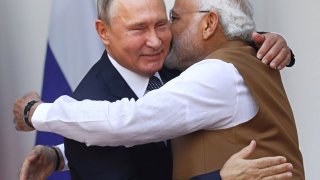India’s Russia Option
India’s absolute tilt in the Western camp will further propel Russia into the Chinese fold.
However, in this exercise, the focus should not be on the optics of being seen as a global leader. China will most likely perceive it as a threat to its global eminence and its vision of Asian unipolarity, as it did when Nehru became the poster boy of the Non-Aligned Movement. Instead, India must harness these global multilateral engagements to secure real and hard strategic leverage, which could be used to pressure China and discourage Beijing from pursuing its military adventures against India. At the same time, the long-term goal should be to strengthen the economy and border infrastructure and enhance technological, defense, space, cyber, and asymmetric capabilities so that the power differential does not widen.
For the United States, it is also best to prevent the escalation of conflict between the Himalayan neighbors. If a war occurs, India will have to make a complete shift to the Western camp, which means degrading its ties with Russia as the latter will not be able to support India. Hence, if Washington wants to sustain New Delhi as a credible and confident neutral voice, a much-needed geostrategic shock absorber in this highly polarised world order, it should focus on preventing the conflict escalation instead of coercively convincing India to go belligerent against China.
India’s absolute tilt in the Western camp will further propel Russia into the Chinese fold, a relationship that is fast transforming into a strategic alliance. The United States has already made the blunder of pushing Moscow into Chinese arms. If rationality prevails, it would not like to repeat itself, resulting in a complete break of Russo-Indian ties by orchestrating India’s total shift towards the West. Lastly, even Beijing must consider the conflict avoidance option seriously because if a military face-off with Indians in Himalayan territory leads to an embarrassing defeat, it will be a significant blow to its image as a global power.
Dr. Abhinav Pandya is a founder and CEO of Usanas Foundation, an India-based geopolitical and security affairs think-tank, and the author of Radicalization in India: An Exploration. His second book, Terror Financing in Kashmir, will be released soon. He has a Ph.D. from OP Jindal University and an MPA from Cornell University.
Image: Exposure Visuals / Shutterstock.com.

